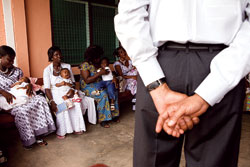US partnering with other nations on global health
July - August, 2009 | Volume 8, Issue 4

Photo by Pete Souza, the White House
President Obama visits a clinic in Ghana to
emphasize U.S. support for maternal and child
health care in sub-Saharan Africa.
Health Diplomacy in Action
In recent months, the United States has signed
agreements to work with countries in Europe, Asia,
South America and Africa on global health issues.
- Angola - for increasing the PEPFAR
contribution to fight HIV/AIDS from $7 million a
year to $17 million.
- Chile - for setting up a cancer registry and
collaborating with the NIH on combating breast
and gall bladder cancer.
- China - for the two countries to work together
on non-communicable, as well as infectious,
diseases.
- India - for creation of a $30 million endowment
to be used for joint research and development,
innovation, entrepreneurial and
commercialization activities in science and
technology.
- Russia - for more cooperation among scientific
institutions on issues including chronic and
infectious diseases, promoting healthy
lifestyles, maternal and child health and global
public health.
- South Korea - for strengthening existing
medical research collaborations and
beginning new ones.
The G8 Summit of international leaders reaffirmed a commitment to address the health needs of the world's most vulnerable people and called for developing capacity in sub-Saharan Africa to do just that.
President Obama underscored that priority when the Summit in Aquila, Italy, ended and he traveled to Ghana to visit a clinic focused on maternal health.
Referring to the administration plan to spend $63 billion over six years to fight global diseases, he told the Ghanaian parliament: "... The true sign of success is not whether we are a source of perpetual aid that helps people scrape by—it's whether we are partners in building the capacity for transformational change. ...We won't confront illnesses in isolation—we will invest in public health systems that promote wellness and focus on the health of mothers and children."
The G8 nations declared their intention to "address substantial gaps in knowledge about how to manage, organize and deliver health care in Sub-Saharan Africa through a variety of strategies, including by developing networks of researchers and by working with our African partners to establish a consortium of interdisciplinary centers of health innovation."
National Security Council staff member Gayle Smith told a Washington briefing sponsored by the Center for Strategic and International Studies and the Kaiser Family Foundation that as a result of the Summit, "I think there is a growing consensus that now is the time to double down and take advantage of what we really know to move forward."
Smith also said there is "a commitment on our part to work with our partners in Africa on research and development in the global health sphere and help establish some institutional capacity."
The G8 meeting and Obama's trip highlighted a flurry of activity in recent months on global health issues, including Secretary of State Hillary Clinton's own visit to Africa, where she announced a more than doubling of PEPFAR aid to Angola.
Earlier, the president agreed with Russia to establish a framework for more cooperation among scientific institutions on issues including chronic and infectious diseases, promoting healthy lifestyles, maternal and child health and global public health.
Clinton signed agreements for health research cooperation with China and India. The United States and India will create a $30 million endowment to be used for joint research and development, innovation, entrepreneurial and commercialization activities in science and technology.
A new alliance between five Latin American countries and the National Cancer Institute and Fogarty began officially with a letter of intent signed with Chile.
HHS Secretary Kathleen Sebelius signed a pact with South Korea to strengthening existing medical research collaborations and begin new ones on a range of issues, including chronic disease prevention. South Korea and the National Institute of Allergy and Infectious Diseases renewed a 2003 agreement to collaborate on infectious disease research.
To view Adobe PDF files,
download current, free accessible plug-ins from Adobe's website.